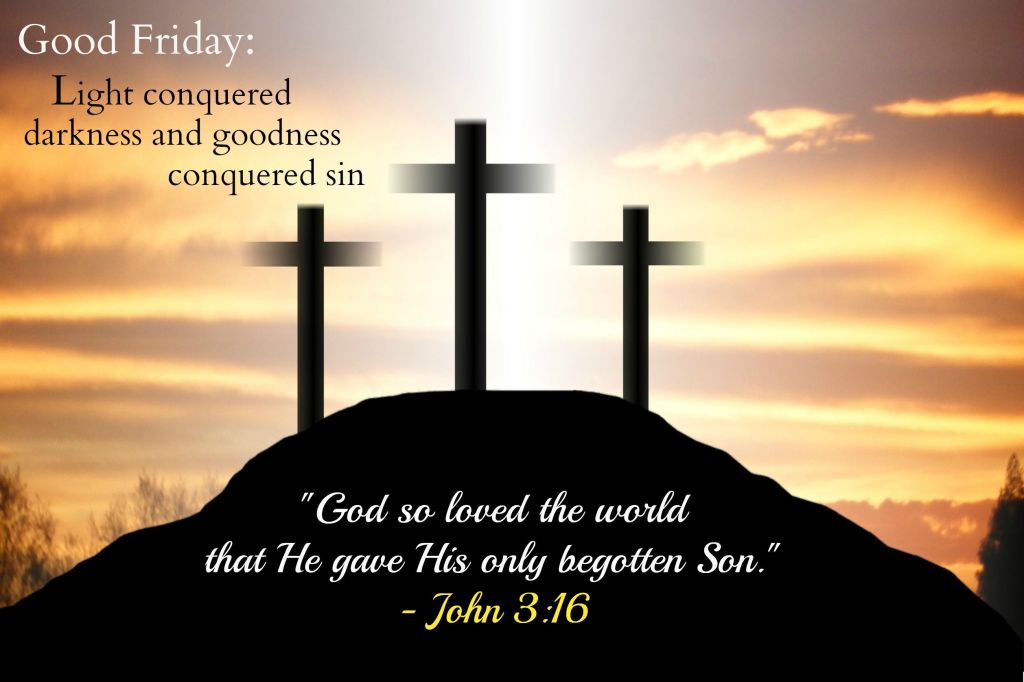The Day That Changed The World.

the Friday before Easter, the day on which Christians annually observe the commemoration of the Crucifixion of Jesus Christ. From the early days of Christianity, Good Friday was observed as a day of sorrow, penance, and fasting, a characteristic that finds expression in the German word Karfreitag (“Sorrowful Friday”).
Following the Synoptic Gospels (Matthew, Mark, and Luke), the mainstream of Christian tradition has held that Jesus’ last meal with his disciples on the evening before his Crucifixion was a Passover seder. That would place the date on which Jesus died on 15 Nisan of the Jewish calendar, or on the first day (starting at sundown) of Passover.
According to the Gregorian (Western) calendar, that date would be April 7. (The Gospel According to John, in contrast, holds that Passover had not yet begun when Jesus’ final meal was held, which would place the date of Jesus’ death on 14 Nisan.) Christians, however, do not commemorate that fixed date. Instead, they follow the apparently flexible date of the Passover—which conforms to the Jewish lunisolar calendar rather than the Gregorian solar calendar—by relating the Last Supper to the seder. Although that assumption is problematic, the dating of both Good Friday and Easter has proceeded on that basis. Thus, Good Friday falls between March 20, the first possible date for Passover, and April 23, with Easter falling two days later. (See also Paschal Controversies.)
The question of whether and when to observe Jesus’ death and Resurrection triggered a major controversy in early Christianity. Until the 4th century, Jesus’ Last Supper, his death, and his Resurrection were observed in one single commemoration on the evening before Easter. Since then, those three events have been observed separately—Easter, as the commemoration of Jesus’ Resurrection, being considered the pivotal event.

Procession of Nazarenos carrying a cross during Good Friday in Valladolid, Spain.
The liturgical celebration of Good Friday has undergone various changes over the centuries. In the Roman Catholic Church the mass is not celebrated on Good Friday, though a liturgy is performed. Beginning in the Middle Ages, only the officiating priest took Holy Communion, which was consecrated in the Maundy Thursday mass; laypeople have also communed on Good Friday since 1955. The liturgy of Good Friday consists of the reading of the Gospel Passion narrative, the adoration of the cross, and Communion. In the 17th century, following an earthquake in Peru, the Three Hour Service, a prayerful meditation on Jesus’ “Seven Last Words on the Cross,” was introduced to the Catholic liturgy by the Jesuits. It takes place between noon and 3 pm. Similar services occur in the Eastern Orthodox tradition, where no Communion is celebrated on Good Friday.

In the Anglican Communion, The Book of Common Prayer similarly provides for a Good Friday reception of the “reserved sacrament,” the consumption of bread and wine that was consecrated the previous day. The Three Hour Service has become common in North American churches, and a variety of liturgical services are held on Good Friday in other Protestant churches. With the revival of a liturgical emphasis in Protestantism in the second half of the 20th century, a distinct trend of adopting Catholic ritual (no use of the organ in the service, draping of the cross, baring of the altar, etc.) developed.
Unlike Christmas and Easter, which have acquired numerous secular traditions, Good Friday has, because of its intense religious connotation, not led to an overlay of secular customs and practices.
I am not as good at this as Reverend Amy but I couldn’t just post cartoons today.
God Bless.
This is an open thread.
i will
March 29, 2024 at 10:23 am |
Thank you, dear Marge, for this important, and informative, Good Friday post. This is such a critically important day for Christians, a solemn day, a day to meditate on all that Jesus endured, and the crucifixion He allowed to happen to save us all from our sins…
Here is a link to today’s Gospel reading for Good Friday. It’s John 18:1 – 19:42:
https://www.biblegateway.com/passage/?search=John%2018-19&version=NIV
March 29, 2024 at 10:38 am |
May this Good Friday be a day of deep reflection on the crucifixion of Jesus Christ, and the Resurrection we celebrate on Easter. Easter, the event that’s most “verified”:
“Easter Is The World’s Most Historically Verified Holiday”
https://thefederalist.com/2024/03/29/easter-is-the-worlds-most-historically-verified-holiday/
March 29, 2024 at 12:39 pm |
Good (Christian Nationalist) Friday
By John Klar
Good Friday this year is an important opportunity to reflect not just on what Jesus Christ accomplished at Calvary, but the many sacrifices that enabled Americans to enjoy the benefits of U.S. citizenship and the “exceptionalism” that non-canceled history and the founding documents of the nation display clearly.
https://www.americanthinker.com/articles/2024/03/good_christian_nationalist_friday.html
March 29, 2024 at 12:50 pm |
March 29, 2024 at 2:33 pm |
Editorial: Learn from Baltimore to reduce the odds it will happen here (again)
https://www.postandcourier.com/opinion/editorials/baltimore-bridge-sc-ports-charleston-scdot/article_50948158-ec46-11ee-a06c-e7f7c61b6020.html
March 29, 2024 at 2:34 pm |
March 29, 2024 at 5:33 pm |
And the same to you, dear friend…
March 29, 2024 at 2:36 pm |
March 29, 2024 at 5:34 pm |